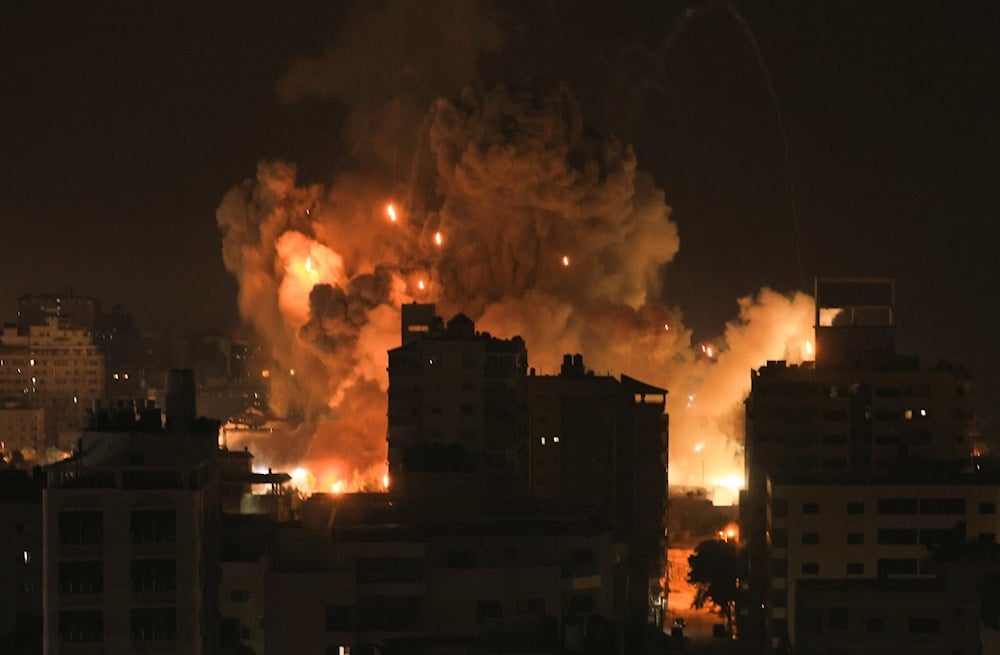Gaza ceasefire agreement within reach: WashPo
US officials say that the framework for a three-stage deal has been established, with only implementation details remaining to be finalized.
-

Fire and smoke rise above residential buildings in Gaza City during an Israeli airstrike on October 8, 2023 (AFP)
David Ignatius, a columnist for the Washington Post, interpreted on Wednesday that a ceasefire agreement that would halt confrontations in Gaza, secure the release of some Israeli captives, and substantially increase humanitarian aid to Palestinian civilians, appears to be imminent.
Ignatius cited a senior US official saying that “the framework is agreed” and the sides are now “negotiating details of how it will be implemented.” However, he also noted that the officials have warned that although the framework is established, a final agreement is likely not imminent, as the details are intricate and will take time to resolve.
Dive deeper
Ignatius detailed that US officials outlined a plan for the ceasefire deal in three stages. The first stage involves a six-week ceasefire, during which Hamas would free 33 Israeli captives, including all women, men over 50, and the injured. In exchange, "Israel" would release hundreds of Palestinian prisoners and pull its troops back from densely populated areas to Gaza's eastern border. Humanitarian aid would be provided, hospitals repaired, and rubble cleared.
In Ignatius' view, the main challenge lies in the next phase, where Hamas would release the remaining male soldiers held captive and both sides would agree to a "permanent end to hostilities" with a "complete withdrawal of Israeli forces from Gaza."
He added that each side fears the other might use the ceasefire period to rearm and resume fighting, stressing that "Israel" is determined to prevent Hamas from "regaining control of Gaza."
The breakthrough
Ignatius claimed that the breakthrough occurred recently when Hamas agreed to drop its demand for a written guarantee of a permanent end to the war. Instead, it accepted the reassuring terms of a UN Security Council resolution passed last month, which supports the US-brokered deal.
“If the negotiations take longer than six weeks for phase one, the ceasefire will still continue as long as negotiations continue,” the U.N. resolution says. American, Qatari, and Egyptian mediators would “work to ensure negotiations keep going until all the agreements are reached and phase two is able to begin.”
He further noted that "Israel" and Hamas have both indicated their approval of an "interim governance" plan set to start in Phase 2, where neither side would control Gaza, adding that security would be managed by a force trained by the United States and supported by moderate Arab allies.
This force, as per Ignatius, would consist of about 2,500 vetted supporters of the Palestinian Authority in Gaza. That said, a US official told Ignatius that Hamas has informed mediators that it is “ready to cede authority to the interim governance arrangement.”
As security improves in "postwar Gaza", the peace plan envisions a third phase involving a "multi-year reconstruction plan," as described by the UN resolution.
The aftermath of the deal in West Asia
Ignatius postulated that as US mediators moved closer to finalizing the agreement, Qatar and Egypt played pivotal roles.
According to Ignatius, Qatar pressured Hamas by informing its representatives in Doha that they would need to leave if they rejected the pact. Meanwhile, Egypt provided crucial support by accepting a novel US proposal to prevent new tunnels from being dug between Egypt and Gaza after a Israeli troop withdrawal.
Read next: What is the real reason behind Qatari PM's remarks on Hamas, talks?
He gushes: "If the cease-fire deal is clinched, it will open the way for two other major changes in the Middle East landscape — involving Lebanon and Saudi Arabia — that could reduce the danger of a broader war."
Ignatius claimed that Lebanon has indicated that after a ceasefire in Gaza, it would support a plan involving the withdrawal of Hezbollah forces northward from the border to the Litani River.
Read next: Hezbollah MP: Resistance to stand ground south, north of Litani
The proposed agreement also entails "Israel" agreeing to border adjustments long sought by Hezbollah, along with additional measures to build trust and cease the lethal exchange of rocket attacks between the two sides, as per Ignatius.
Amos Hochstein, a member of Jake Sullivan's national security adviser team, has negotiated the framework for Lebanon. Instead of engaging directly with Hezbollah, Hochstein has held discussions with Nabih Berri, the speaker of the Lebanese parliament.
Ignatius also underscores that there is potential for Saudi Arabia to move towards normalizing relations with "Israel" following a cease-fire in Gaza, as indicated by a US official.
He concluded by saying: “Every war must end, as strategist Fred Iklé wrote about Vietnam. Gaza isn’t over. But as one White House official put it late Wednesday: fingers crossed."
Read next: Why is Saudi Arabia open to normalize relations with 'Israel'?

 5 Min Read
5 Min Read








